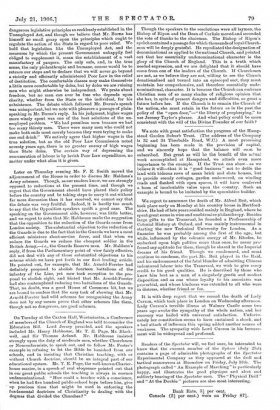Later on Thursday evening Mr. F. E. Smith moved the
adjournment of the House in order to discuss Mr. Ha1dane's Army schemes. Though, as our readers know, we are strongly opposed to reductions at the present time, and though we regret that the Government should have placed their policy before the country and be taking steps to carry it out without far more discussion than it has received, we cannot say that the debate was very fruitful. Indeed, it is hardly too much to say that the Opposition speakers spoilt a good case. The speaking on the Government side, however, was little better, and we regret to note that Mr. Hobhouse made the suggestion that the opposition to the reduction of the Guards came from London society. The substantial objection to the reduction of the Guards is due to the fact that in the Guards we have a most efficient miniature short-service force, and that when we reduce the Guards we reduce the cheapest soldier in the British Army,—i.e., the Guards Reserve man. Mr. Haldane's reply, if from the Parliamentary point of view fairly effective, did not deal with any of those substantial objections to his scheme which we have put forth in our first leading article. He pointed out, for example, that Mr. Arnold-Forster had definitely proposed to abolish fourteen battalions of the infantry of the Line, yet now took exception to the pro- posal to abolish eight, and hinted that Mr. Arnold-Forster had also contemplated reducing two battalions of the Guards. That, no doubt, was a good House of Commons hit, but we are bound to confess that the easy task of showing that Mr. Arnold-Forster had wild schemes for reorganising the Army does not by any means prove that other schemes like them, though not so dangerous, are good schemes.






































 Previous page
Previous page